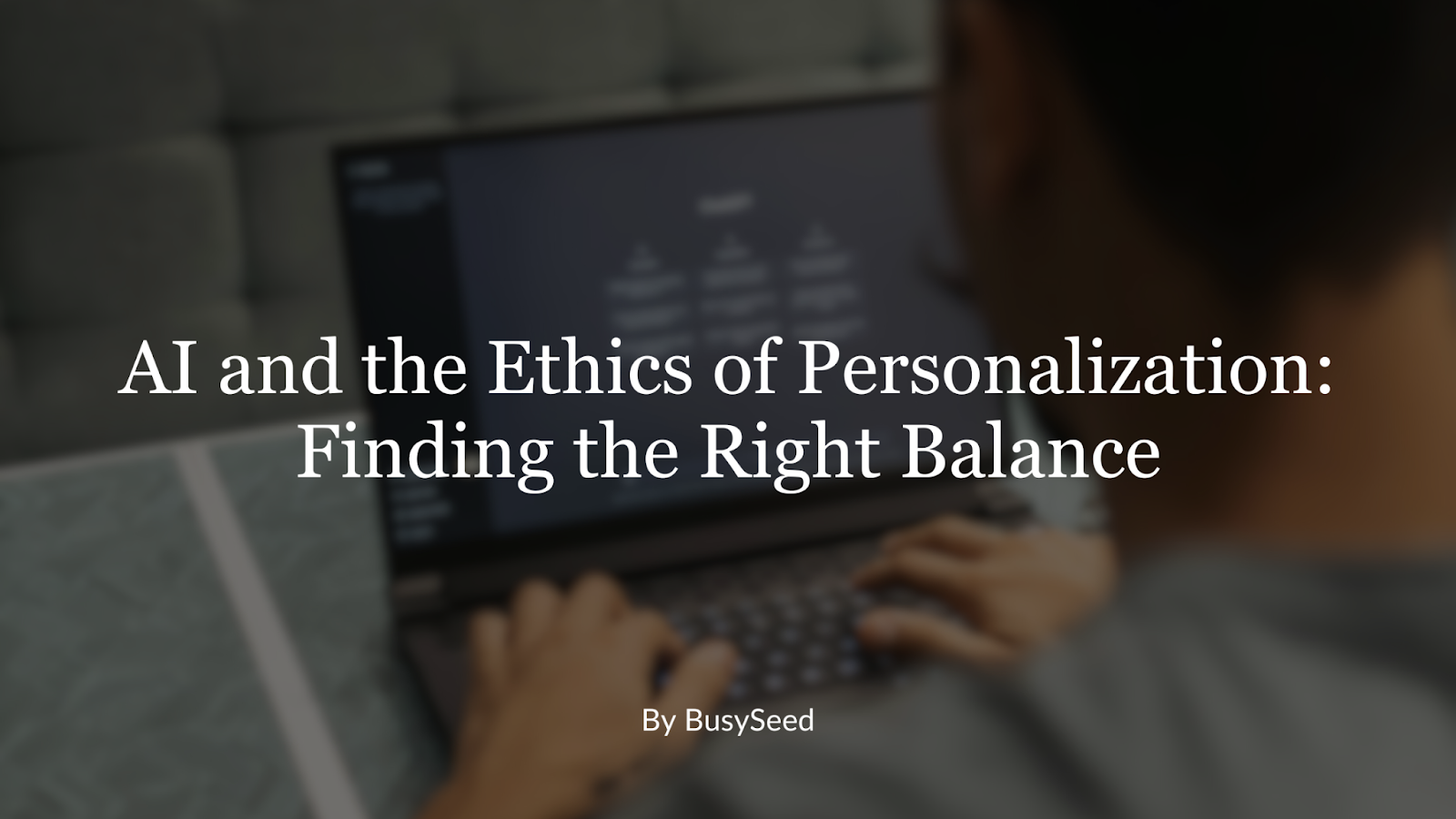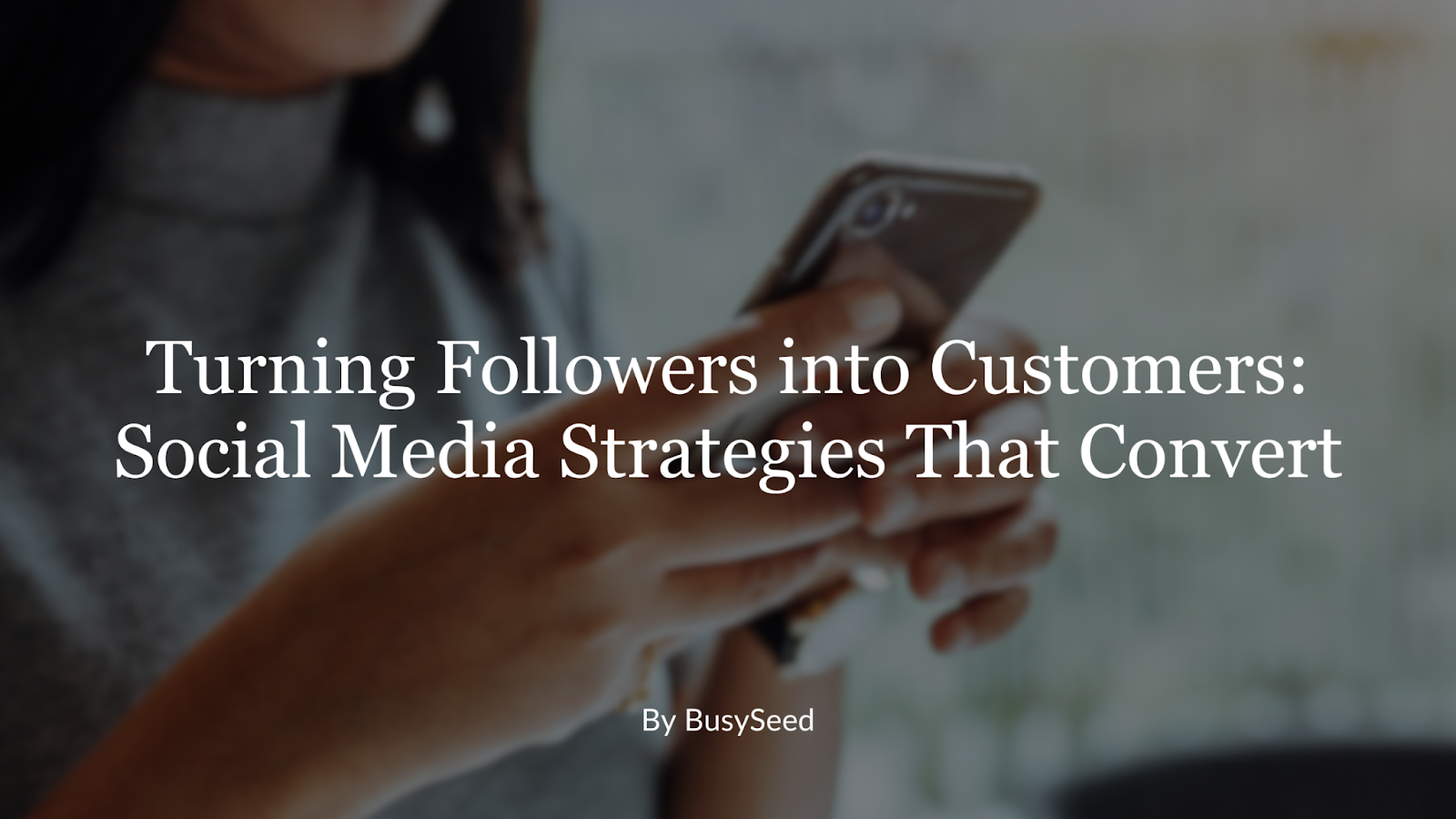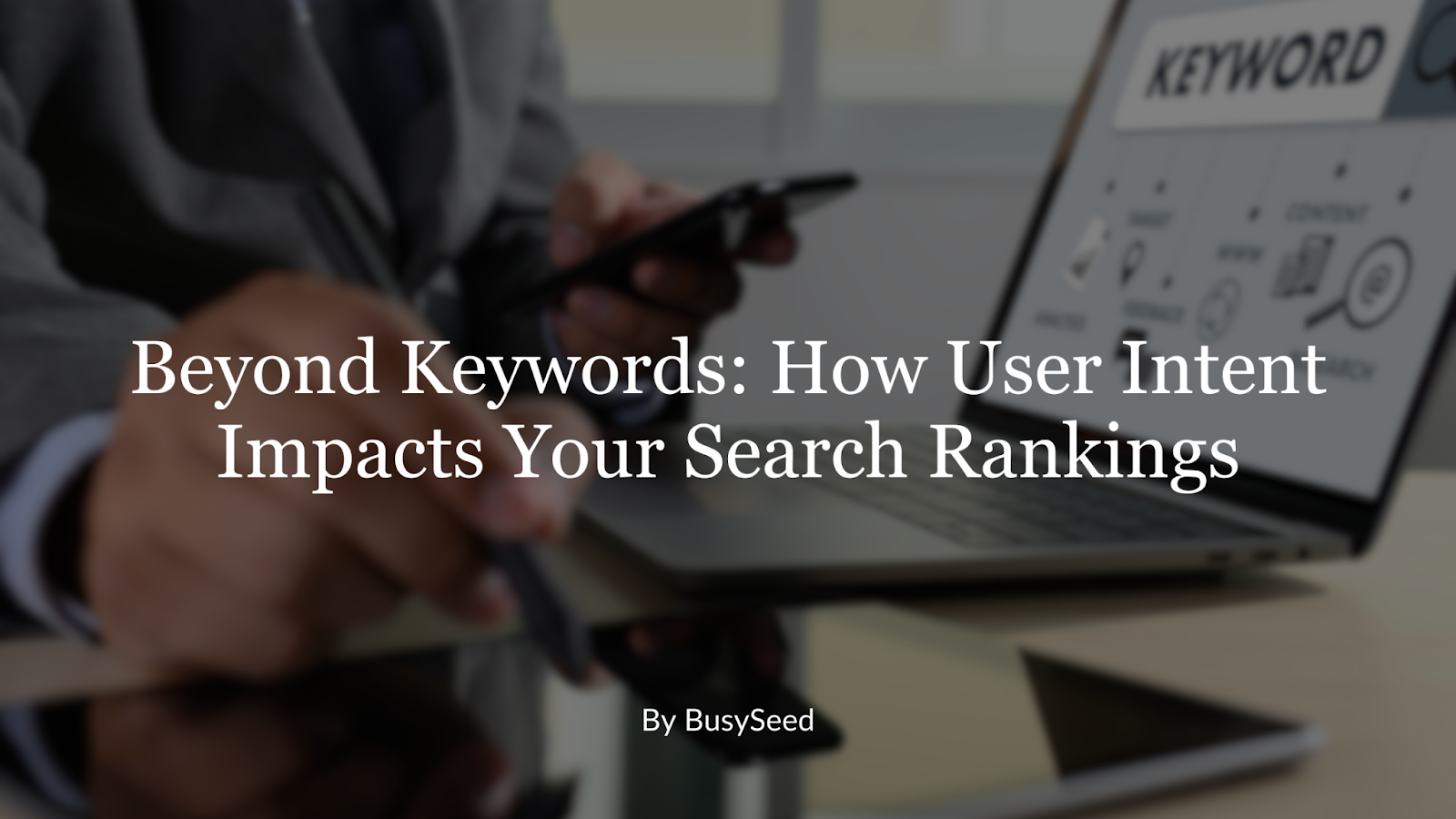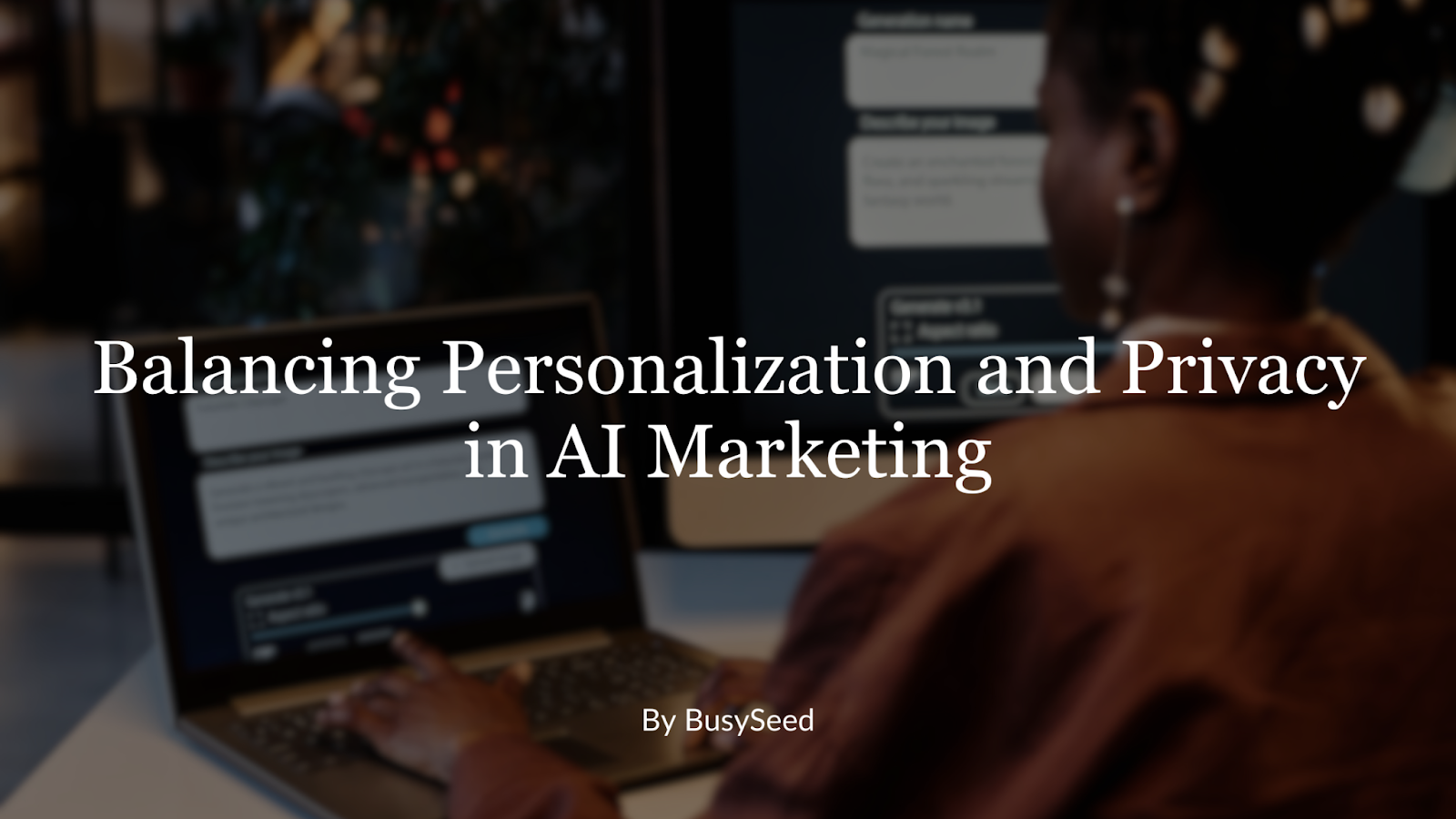Too long, didn't read?
Not to worry! We can sit down together and explain our findings and the contents of this blog in detail. This discussion will include insights from " ". Schedule some time on the right with our CEO.
AI and the Ethics of Personalization: Finding the Right Balance
AI-powered personalization can be incredibly powerful, but it also raises ethical concerns. This post will explore the potential downsides, such as privacy invasion, filter bubbles, and manipulation. Offer guidelines for responsible AI use, emphasizing transparency, user control, and data security.

AI and the Ethics of Personalization: Finding the Right Balance
Artificial intelligence (AI) has transformed the world of digital marketing, making personalization more powerful than ever. Businesses can now tailor experiences down to the individual level, improving customer engagement and driving conversions. However, this power comes with ethical implications. How much is too much when it comes to personalized marketing? Where should brands draw the line between relevant recommendations and invasive targeting?
In this blog, we’ll examine the ethical challenges of AI marketing, including data privacy concerns, algorithmic manipulation, and the creation of filter bubbles. We’ll also provide actionable strategies to ensure responsible AI personalization.
The Power and Pitfalls of AI in Marketing
AI-driven marketing is revolutionizing how brands connect with customers. From predictive analytics to automated content recommendations, AI allows businesses to create hyper-personalized experiences that feel uniquely tailored to each user.
However, with great power comes great responsibility. Many New York City advertising agencies and global brands must navigate serious ethical concerns:
- Data Privacy in AI: AI marketing relies heavily on data—often personal and behavioral. Without transparent policies, businesses risk breaching consumer trust.
- Manipulation and Exploitation: AI can subtly steer consumer behavior in ways that may feel manipulative rather than helpful.
- Filter Bubbles: Over-personalization can limit exposure to diverse content, creating echo chambers that reinforce biases.
1. Data Privacy in AI: Protecting Consumer Trust
Consumer data is the backbone of AI marketing. However, mishandling this data can lead to serious consequences, from regulatory fines to reputational damage. According to a 2023 Pew Research survey, 79% of Americans are concerned about how companies use their data.
Best Practices for Ethical AI Marketing and Data Privacy
- Be Transparent: Let users know what data is being collected and how it will be used.
- Give Users Control: Provide easy opt-in and opt-out options for personalized experiences.
- Secure Data Handling: Implement robust encryption and compliance measures (such as GDPR and CCPA).
Responsible AI personalization starts with fostering trust. If your customers feel their privacy is being respected, they’ll be more willing to engage with your brand.
2. AI Marketing Challenges: When Personalization Crosses the Line
While personalization enhances engagement, it can also feel invasive if not handled properly. A 2022 study by Accenture found that 41% of consumers find it "creepy" when brands know too much about them.
Examples of AI Overreach in Marketing
- Predictive Ads Gone Wrong: Imagine a user searches for health-related symptoms, only to be bombarded with ads for prescription medications. This can be perceived as intrusive rather than helpful.
- Emotional AI Manipulation: Some brands use AI to detect moods and emotions and then deliver ads that exploit vulnerabilities, raising serious ethical concerns.
To avoid these pitfalls, New York City advertising agencies and marketing teams must establish ethical guidelines for AI use.
3. Filter Bubbles: The Unintended Consequences of AI Personalization
AI relies on past behavior to predict future preferences. While this improves user experience, it can also lead to a lack of content diversity, often referred to as a "filter bubble."
How Filter Bubbles Harm Consumers and Businesses
- Limited Perspectives: Consumers are only shown content that aligns with their existing beliefs, reducing exposure to diverse viewpoints.
- Missed Opportunities: Businesses may unintentionally exclude potential customers who fall outside of predefined data sets.
Businesses should allow users to customize their AI-driven experiences, ensuring a balanced mix of personalized and exploratory content to counteract filter bubbles.

Principles of Responsible AI Personalization
So, how can businesses strike the right balance between personalization and ethics? The key lies in responsible AI personalization.
1. Implement Transparency and Explainability
AI decisions shouldn’t feel like a "black box." Brands should:
- Provide clear disclosures about how AI-driven recommendations work.
- Inform consumers when AI is being used in decision-making processes.
2. Promote Ethical AI Marketing Guidelines
Businesses must establish internal guidelines for AI marketing challenges that prioritize ethics. This includes:
- Regular audits to ensure AI models aren’t engaging in manipulative practices.
- Consumer education initiatives to help users understand data usage.
3. Enable User Control Over Personalization
Giving users more control over their personalized experiences fosters trust. Consider adding:
- Preference settings that allow consumers to adjust recommendation algorithms.
- “Reset” buttons that let users clear previous personalization history.
4. Strengthen Data Privacy in AI Marketing
As AI marketing challenges evolve, maintaining robust ethical standards around data privacy is non-negotiable. This includes:
- Limiting the amount of personal data stored.
- Ensuring AI algorithms undergo regular privacy compliance checks.
Why Ethical AI Marketing Matters for Businesses
Responsible AI personalization isn’t just about avoiding regulatory issues—it’s about long-term brand reputation. When consumers trust a brand to use AI responsibly, they are more likely to become loyal customers.
New York City advertising agencies, startups, and Fortune 500 companies must recognize that the future of AI marketing hinges on ethical execution. Brands that get this right will not only avoid reputational risks but will also gain a competitive advantage in the market.
Partner with BusySeed for Ethical AI Marketing
AI marketing is here to stay—but it must be done responsibly. At BusySeed, we’re committed to helping businesses navigate the evolving landscape of AI-driven personalization while upholding ethical standards.
Looking to implement responsible AI personalization strategies without compromising user trust? Schedule a free consultation with BusySeed today and let’s build ethical, AI-driven growth together.
For more insights, explore our AI-driven marketing services and discover how we can help elevate your brand with ethical AI solutions.











